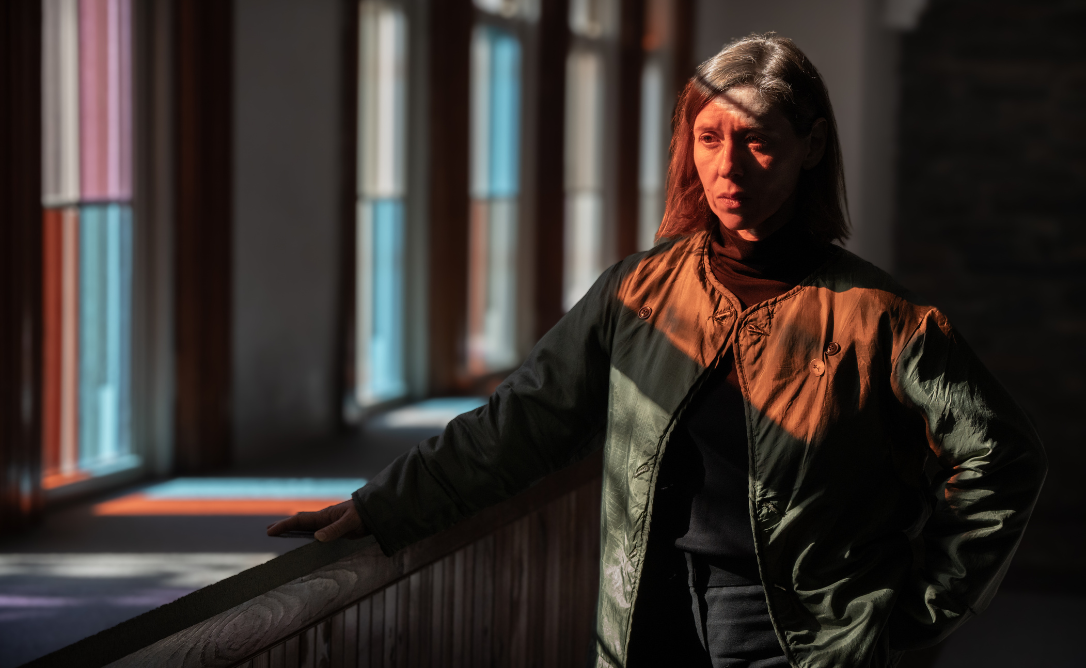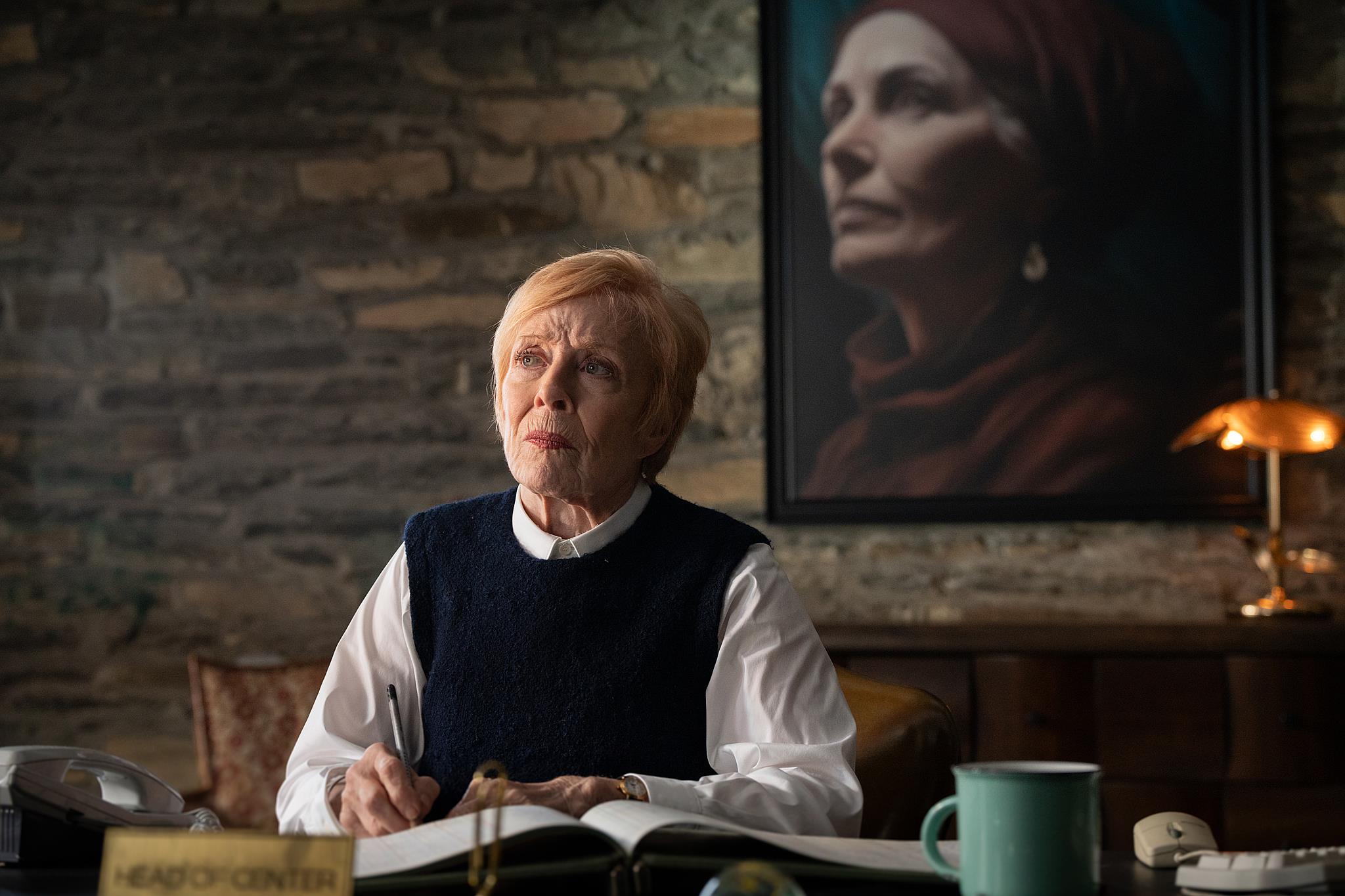
Director Evan Matthews presents at the 2025 Julien Dubuque International Film Festival the feature film Motherland, a dystopian work starring Miriam Silverman, Néstor Carbonell, Holland Taylor, and Emily Arancio. The film provokes reflection by portraying an alternative reality where the State takes over the upbringing of children, removing this essential role from the parents. With a strong cast and a bold approach, Motherland raises profound debates about individual freedom, family responsibility, and the future of society.
In Motherland, you present a world where the state takes care of the children. Where did this provocative idea come from, and how did it evolve into a screenplay?
The idea came through screenwriter Nicole Roewe and her study of post Bolshevik Russia, where a similar experimental society was attempted for 10 years. Ultimately this program failed due to a catastrophic population decline. But she asked herself what would happen if this experimental society happened in the United States and lasted for nearly 100 years? It was a fun thought experiment played out dramatically through one of the society’s elite gatekeepers, Cora played by Tony Award winner, Miriam Silverman.
You direct a cast featuring names like Miriam Silverman and Holland Taylor. How was the direction process in a film that demands so much emotionally from the actors?
To put it mildly, it wasn’t easy. We had the unique circumstances of being the only film in production on the entire East Coast due to the writers and actors strike. This prevented us from having a typical rehearsal. Or even a table read with any of the actors. Because of the lack of ability to prepare with my cast and form bonds with them, I had to spend much more time in a director’s rehearsal on set prior to the blocking rehearsal and then eventually shooting it for real. This is especially difficult in an indie film shoot where you have limited resources and very little time to accomplish anything due to budget, actor availability, and location restraints. Sometimes we would spend 30 to 40 minutes on a director’s rehearsal, which is absolutely unheard of, but I knew if we didn’t take the time to get it right then we would be fighting to save the soul of the film in post. Myself and the cast had to figure out the key character beats and motivations that made sense for their arc, and then properly track that throughout the rest of the film. I am very fortunate to have such a veteran, talented, and decorated cast like (Tony Award winner) Miriam Silverman, (Emmy Award winner) Holland Taylor and (Emmy Award winner) Néstor Carbonell. They have wonderful instincts and are highly collaborative and it’s fun to take our time because this is what actors really want and need and it gave me the ability to work, explore, and build trust with them. Also, it allowed me to learn how they work (their technique or preferred method). If you don’t create a safe space for the actors to do their best work everyone starts to isolate and protect their performances and save themselves and then you’re not collaborating and everyone’s going in different directions and I wanted to avoid that scenario. Thankfully, with the help of Pat McCorkle and the producers we put together an amazing cast. Zinnia, played by newcomer Emily Arancio, also brought amazing talent to the screen. I expect the world to see more of her.

The dystopian world of your film seems unsettlingly close to reality. What reflection do you want to provoke in the audience?
I think for a sci-fi dystopian world to really take root in the audience’s mind, It has to be close to reality, dangerously close to the point where it seems like a cautionary tale. I believe when we do the job right and we create a world that people are able to let go and escape into I don’t actually have to preface anything. From the audience reactions I’ve had so far, which have been overwhelmingly positive, is that people are holding their own mirrors up to this world, and seeing themselves in it or seeing reflections of the real world of what could have been and how dangerously close we could be to a motherland situation. What is particularly satisfying is how people have a varying array of interpretations of the film’s themes and what it means to them. And that’s what movies are all about! If you go to a museum and you look at a 500 year-old masterpiece, the artist is no longer there to tell you what the painting is about. There might be a plaque with a little bit of context of the era in which it was created. Otherwise, it’s up to the viewer to interpret what they are feeling based on what they’re looking at. I think what is great about Motherland is that it challenges the viewer to think and feel and walk away with an overwhelming sense of freedom and hope for the future. There is an acute cathartic effect for those who experienced Motherland.
The Julien Dubuque IFF is known for embracing bold narratives. What does it mean to you to showcase Motherland in this context?
Oh, it means the world to me. JDIFF has been on my radar for a very long time so I’m incredibly flattered and thankful to be able to screen there. You go into making a film and having a plan and a strategy to hit all these emotional beats and cues and tell a great story that affects other human beings and taps into their humanity and to know that Motherland has done this for the programmers at JDIFF just set my heart on fire. I can’t wait to get there and share the movie with the wonderful people of Iowa.
The visual and sound design of the film conveys a sense of control and unease. How did you conceive these elements to complement the central theme?
My goal early on was to manipulate the audience as much as humanly possible: emotionally, visually, and audibly. Since the world primarily deals with systems of control in order to keep the society functioning, I wanted the visuals to really impact the audience on a subconscious level with the stifling of colors, the environment, in the walls, and the lack of ability to be in wide open spaces and have any sense of real freedom or access to nature. Even in the opening frames of the movie, you’re forced to see the world through Cora‘s lens which constricts the frame. It’s not until the midpoint of the film when Cora discovers the greenhouse that we start to get into nature start to get back to the world, of the proper order of humanity, and what we are primarily drawn to. When we do this in the movie, it’s a very deliberate action of allowing the real colors of nature and the real colors of the world to reach the audiences eyeballs for the first time so it’s intensely beautiful and visually pleasing, and it should create a desire for us to gravitate back towards nature and a primal order of things. And of course, this includes motherhood. Imagine escaping Plato‘s cave and then summoning the courage to go back into the cave to rescue the others after having your eyes opened and narrowly escaping in the first place… the soundscape of the film operates in a very similar way making sure we create this world where those things behind the walls, force you inward and trapped in these spaces. There are certain moments in the film where you think you’re getting away from the Motherland effect, but it’s all produced. It’s all manipulation tools by the world of Motherland. But there’s the score which I’m particularly fond of. It’s one of my favorite parts of filmmaking. Working with Jackson Greenberg on the score was an incredible process. We considered many composers during pre-production and when I heard Jackson’s work and his ethereal sound and experimental breath work, I knew we would find the perfect vibe for the world of Motherland through him. Because there’s so many women that suffered in this world and were rendered voiceless in the past I wanted to use the score and the labored breathing of those women to haunt us a little bit and as an audience to say okay, there’s an undercurrent of this world being hidden away from us. It really taps into the primal instincts of our hero, Cora, which is something universal that the audience can identify with; that voice inside of us is yelling or screaming or trying to get our attention… That’s what the score is doing in this world and then we can use the score in specific moments to open up and be beautiful for those great hopeful, rewarding moments, almost as if freeing souls of the past and sending them home.
What do you hope the audience will take away after watching the film and participating in the discussions at the festival?
I really hope the audiences at JDIFF walk away feeling moved and hopeful. Of course, the movie has to entertain which it does, but from the screenings we’ve had so far I’ve been blown away with the staying power of Motherland in people‘s minds and how it’s continued to open up discussions with each other and with me and having these robust Q&A‘s after the movie. And since JDIFF has such an enthusiastic and passionate film going crowd, I expect us to have another wonderful exploration of the world of motherland and what it took to make this movie. The experience has been so far that people are holding up the mirrors of themselves to the film, they are seeing their reflection in it in some way or another. I found a lot of people have been emotionally walloped by the film, especially by the world class performances, and everyone sees a little something different in it that they relate to and I think that is just absolutely amazing and is exactly why I want to make movies like this. You connect with people in a variety of different ways, but in the end, it’s all about being human and wanting a better life for ourselves and the people we love. And Motherland shows us how.
Follow Evan Matthews on Instagram


